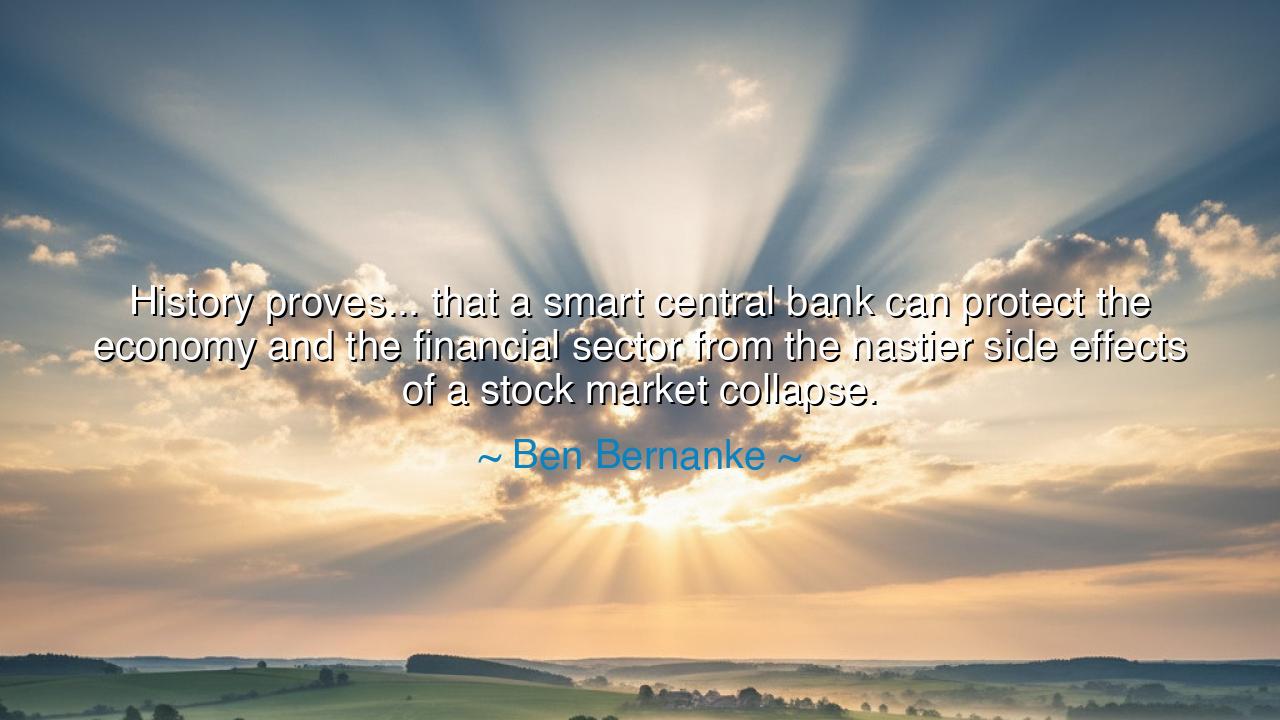
History proves... that a smart central bank can protect the
History proves... that a smart central bank can protect the economy and the financial sector from the nastier side effects of a stock market collapse.






Hearken, O children of commerce and stewards of wealth, and attend the words of Ben Bernanke, who spoke with the insight of one who has gazed upon the tides of economy and history: “History proves... that a smart central bank can protect the economy and the financial sector from the nastier side effects of a stock market collapse.” In these words lies a meditation upon foresight, prudence, and the sacred responsibility of institutions to shield society from the storms that may arise when markets falter. Bernanke reminds us that knowledge of history is not mere scholarship, but a guide to action, enabling wisdom to temper chaos and preserve stability.
The wisdom of a central bank, Bernanke teaches, is in its foresight and its capacity to intervene when disorder threatens. Like ancient guardians of granaries or treasuries, a wise central bank observes the currents of commerce, anticipates peril, and acts to prevent collapse. History is filled with instances where failure to act led to disaster: the Panic of 1907, where the absence of coordinated intervention allowed fear to spread, and trust to vanish, imperiling countless lives. By contrast, well-informed action, grounded in historical understanding, can protect the foundations of prosperity.
Consider the Wall Street Crash of 1929 and the ensuing Great Depression. The financial world, unprepared and rigid, saw banks fail and fortunes evaporate. Millions were plunged into poverty, unemployment soared, and faith in the system was shattered. Scholars and policymakers alike observed that the absence of decisive intervention amplified the collapse. Bernanke’s insight draws upon this memory, underscoring that a smart central bank, acting with both prudence and authority, can prevent localized financial tremors from erupting into widespread catastrophe.
The lesson is evident in the response to the 2008 financial crisis, when Bernanke himself, as Chairman of the Federal Reserve, applied these principles. By providing liquidity, stabilizing banks, and coordinating with international institutions, he mitigated what could have been a collapse of global proportions. The history of prior failures informed action, demonstrating that knowledge, preparation, and decisive intervention are the tools by which central banks protect not merely markets, but the well-being of millions of citizens.
Bernanke’s reflection also carries moral weight. Wealth, commerce, and the mechanisms of finance are not ends in themselves—they are instruments for the sustenance of society. When markets falter, the consequences extend beyond numbers, affecting lives, families, and communities. A central bank that acts wisely embodies human responsibility, using knowledge and foresight to safeguard the common good, honoring the lessons written by past crises.
From this insight flows practical guidance: study history diligently, observe patterns of behavior in markets, and respect the mechanisms that sustain economic life. Leaders and citizens alike benefit from understanding the causes and effects of financial collapse, for knowledge equips one to act prudently, anticipate risk, and contribute to stability. Whether in governance, commerce, or personal stewardship, the principle is the same: informed foresight is the shield against the fury of chaos.
Even ordinary individuals can draw wisdom from Bernanke’s words. Diversification of resources, measured risk-taking, and preparation for uncertainty reflect the same principles that guide central banks. History teaches that those who ignore lessons of collapse are often the most vulnerable, while those who act with knowledge, prudence, and patience withstand the storms that buffet the world. The stewardship of wealth, like governance, demands awareness, humility, and foresight.
Thus, remember: history is both teacher and sentinel. Ben Bernanke’s words remind us that intelligence, preparation, and decisive action can shield the many from the chaos that arises in markets. A smart central bank, informed by the past, preserves not merely wealth, but stability, trust, and the welfare of society. Let this guide your understanding of economics, your respect for institutions, and your personal conduct in times of uncertainty, for wisdom and foresight are the bulwarks against collapse.
If you wish, I can also craft a more dramatic, audio-ready version, vividly illustrating the Wall Street Crash, the Great Depression, and the 2008 crisis to make Bernanke’s message emotionally and intellectually compelling for listeners. Do you want me to do that next?






AAdministratorAdministrator
Welcome, honored guests. Please leave a comment, we will respond soon